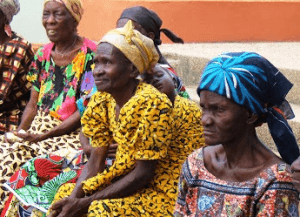HelpAge Ghana urges government to expedite action on Aged Bill
 Mr Edward Ameyibor, Vice President of HelpAge (HAG) Ghana, has called on government to expedite action on the passage of the National Aged Bill to improve the well-being of the elderly.
Mr Edward Ameyibor, Vice President of HelpAge (HAG) Ghana, has called on government to expedite action on the passage of the National Aged Bill to improve the well-being of the elderly.
He said the passage would also protect and promote the rights of the older persons as well as help establish the National Council on Ageing to coordinate the implementation of the National Ageing Policy approved by Cabinet in 2010.
Mr Ameyibor said this when a delegation from the HelpAge Ghana paid a courtesy call on the Minister of Gender, Children and Social Protection in Accra to discuss issues that impact on the well-being of the elderly in Ghana.
The call, which formed part of HAG’s activities to commemorate this year’s World Elder Abuse Awareness Day, was also to submit written recommendations for consideration by the Ministry towards addressing the issues to be raised.
Mr Ameyibor said the United Nations designated June 15 every year as World Elderly Abuse Awareness Day (Resolution 66/127).
He commended the government for the various interventions put in place to comfort the elderly in the society.
He urged the Ministry to facilitate engagements aimed at improving the quality of healthcare services received by the elderly, specifically taking advantage of the offer made through Akrowa Aged Life Foundation in Ghana.
Mr Ameyibor said the Ministry should team up with offices of the National Health Insurance Scheme (NHIS) and District Assemblies to embark on community awareness campaigns to increase the understanding of rights and entitlements of older persons under the National Health Insurance Act, 2012 (Act 852).
“Particular effort should be made to package the awareness messages in a form that would easier for older persons, especially the illiterate to understand. This will go a long way to increase in a more sustainable and cost-effective way access of older persons to services under the NHIS, “he added.
Mr Ameyibor also urged the Ministry to engage with relevant institutions with the aim of increasing access of older persons to legal aid services when their rights are violated and abused.
Nana Oye Lithur, Minister of Gender, Children and Social Protection, on her part, said the Bill on the aged is at the A-G’s office for fine tuning and congratulated the delegation for the recommendations.
She said as part of government policy they had put in place measures such as the EBAN Card to facilitate access to banking and healthcare services by older persons and to provide 50 per cent rebate on public transport fares for them.
Others, she said, include free registration of older persons for healthcare services under the NHIS, increasing enrolment of poor older persons who are over 60 years and above on the Livelihood Empowerment Against Poverty (LEAP) Cash transfer Programme across the country.
“’Inauguration of the National Advisory Committee on Ageing and launch of the National Social Protection Policy in June, 2016, among others are some of the government efforts towards older persons in Ghana,” she said.
Nana Oye Lithur said since they started the free registration of older persons, they have managed to register over 16,000 people while 21,000 older persons were registered on the EBAN Card project with 4,000 yet to be registered.
She said the Ministry is deliberating on rolling out on pilot basis older volunteer services and their first point of call would be retired teachers and hospital workers.
“We would work with the national Service Scheme to see how to work around it aside the law. We are thinking about core of retired teachers to do remedial for children who fail their examinations and are from poor homes who want to go back to school,” she added.
The Minister said one of the chiefs from Keta had offered the Ministry a land for the establishment of Day Care Centre for the older persons but currently the Ministry is having problem with funding and urged the private sector to partner with them to ensure the realisation of the project.
She said plans are underway to mainstream geriatric care with the country’s health training institutions’ curriculum so that more people could be trained in that direction.
Source: GNA
